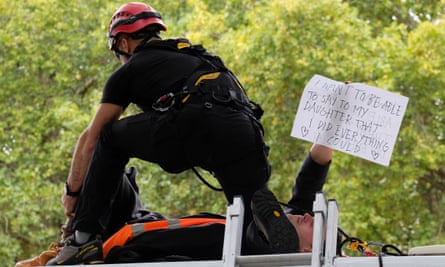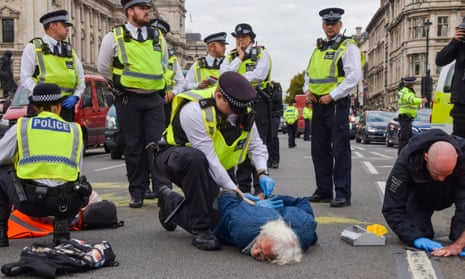To tell “the truth, the whole truth and nothing but the truth”: this is the oath defendants in an English court must take. But when David Nixon sought to do so, he was sent to jail.
Nixon, who had taken part in an Insulate Britain protest blocking a junction in the City of London, was on trial for causing a public nuisance, a charge that carries a maximum sentence of life imprisonment. He sought to explain his motivation to the jury. But the judge, Silas Reid, had instructed the defendants not to mention their reasons for taking action: namely climate breakdown, fuel poverty and the need for better insulation. When Nixon disregarded this instruction, Reid handed him an eight-week jail sentence for contempt of court.
The same instructions were issued by Reid to a defendant in another protest trial, Ruth Cook. She obeyed his directions but, she told me, “It felt really odd. It’s hard to connect to the jury if you can’t explain why you are there.”
He gave the same order to Stephanie Aylett, when she was tried on the charge of public nuisance. She tells me she tried to abide by it. “When I made my closing statement, the judge didn’t interrupt. He let me speak. I was saying things that I thought were just my opinion. Such as that my idea of significant disruption is one-third of Pakistan being under water.” She apologised for “inadvertently causing contempt. I clearly didn’t mean to do it.” The contempt charge was not pursued. The jury found her guilty of the public nuisance charge and she will be sentenced on 24 March.
She told me: “It’s as if you had hit someone in self-defence but were not allowed to say you were being attacked. The judge refused our only two defences: necessity to act and proportionality. How can we talk about this action without saying why we did it?”
The problem is that when people are tried on the ancient charge of public nuisance, motivation and proportionality are not a defence. By choosing this charge, the prosecution service denies defendants the right to explain themselves. It is hard to see how justice is served by ensuring that the whole truth cannot be heard.
As the defendants were unable to speak freely, these cases were assessed as if there were no moral difference between a selfless attempt to prevent the greatest catastrophe humanity has ever faced, and an inebriated ruck after closing time.

Many other environmental protesters have been charged under this stifling law and await trial. It makes you wonder why the government, with such a lethal weapon on the statute book, feels the need to introduce even more oppressive legislation. Police and prosecutors now have so many laws to choose from that they can both prevent any meaningful protest from happening and ensure that protesters’ defences are as weak as possible.
When judges and juries considering other charges are allowed to hear protesters’ motivations, they have in some cases taken a broader view of the law. For example, in 2019 two climate activists were unanimously acquitted by a jury of criminal damage. The defendants admitted spray-chalking a building at King’s College London while seeking to persuade it to divest from fossil fuels, but argued successfully that their action was a proportionate response to the climate crisis.
In 2020, a judge found three Extinction Rebellion protesters guilty of breaching a section 14 public order notice. But he is reported to have told them: “Thank you for your courtesy, thank you for your integrity, thank you for your honesty. You have to succeed.” He is said to have continued: “This is going to be my last Extinction Rebellion trial for a little while. I think they only allow us to do so many of these before our sympathies start to overwhelm us.”
In 2021, the activist Rowan Tilly was convicted for obstruction of the highway during an Extinction Rebellion protest. But the judge, citing the civil rights, anti-apartheid and suffragette movements, praised her as “honest” and “sincere” and gave her an absolute discharge. In the same year, a jury acquitted six Extinction Rebellion protesters of criminal damage to Shell’s London headquarters, after they were able to explain their reasons.
Last year, seven Doctors for Extinction Rebellion were acquitted of breaching section 14 charges. The judge said: “I was impressed by the integrity and rationality of their beliefs … their evidence was highly moving.” This month, four Scientists for Extinction Rebellion won their appeal against criminal damage convictions in Southwark crown court. The judge said:“The protesters held heartfelt and real concerns about climate change and these are very important issues.”
As our environmental emergencies intensify, so do the costs of seeking to defend our life support systems. In the UK and other jurisdictions, governments are introducing ever more draconian laws against environmental protest, protecting the profits of destructive industries against their challengers. They seek, by various means, to silence us: extreme and tyrannical laws against dissent, surveillance and espionage, attempts in some cases to treat us as terrorists.
These efforts to stifle protest make it even more important that, when cases come to court, the whole truth is told. No decision is improved by knowing less. But knowledge is inimical to power. As the former prime minister John Major remarked, during another of the Tories’ periodic assaults on justice: “Society needs to condemn a little more and understand a little less.”
The protesters condemned as criminals today will be the heroes of tomorrow. One of the greatest fears of those who wield power is that judges and juries will come to see them this way.
This article was amended on 22 February 2023 to accurately set out the details of the charge of which Stephanie Aylett was convicted.
George Monbiot is a Guardian columnist
Do you have an opinion on the issues raised in this article? If you would like to submit a response of up to 300 words by email to be considered for publication in our letters section, please click here.

